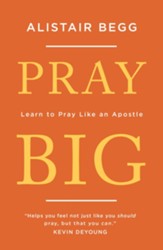
Quotes by Alistair Begg
[We must have] the ability to distinguish issues that truly matter from ones that do not. We do not want to be flexible about moral and theological convictions (the great doctrines of the church). But it is also wrong to be brittle about issues that are not foundational to our faith.
We should neither court suffering nor complain about it. Instead, we should see it as one of the means God chooses to employ in order to make us increasingly useful to the Master. It is from this perspective that James urges his readers to “consider it pure joy…whenever you face trials of many kinds” (James 1:2).
James Stewart used to say, “Be yourself, but also, forget yourself!” Self-forgetfulness is of vital importance. We cannot make much of ourselves and much of the Lord Jesus Christ simultaneously. If people leave worship saying, “What an amazing preacher!” we have failed. Instead we must long for them to say, “What a great God, and what a privilege it is to meet Him in His Word, as we have just done.”
We are not simply a society in which we recognize the existence of, and the differences between, a variety of religious beliefs, but one in which we declare all such beliefs are to be equally valid. From that perspective there is only one kind of heresy, namely, to claim that one view is ultimately right, where others are wrong. In granting plausibility to everything, we may grant certainty to nothing. Tolerance has been embraced at the expense of truth… To allow that everyone and everything is right is to destroy the notion of truth itself.
As a result of grace, we have been saved from sin’s penalty. One day we will be saved from sin’s presence. In the meantime we are being saved from sin’s power.
Made For His Pleasure, Moody Press, 1996, p. 39. Get this book!
A preoccupation with psychological theory has in many cases eroded confidence in the Scriptures. When the essence of the human predicament is redefined in terms of lack of self-esteem, it is almost inevitable that people will be directed toward a couch but not a cross, a psychologist but not a Savior.
If Christians do not rejoice it is not because they are Christians, but because they are not Christian enough. Joy is the rational state of the Christian in view of his spiritual position in Christ.
Moralism says to unbelievers, “Be what you are not.” Christianity says to believers, “Be what you are.”
The preacher’s task is to declare what God has said, explain the meaning, and establish the implications so that no one will mistake its relevance.
Preaching for God’s Glory, Crossway, 1999, p. 29. Get this book!
We make a great mistake if we think of (pleasing God) as a compartment of life marked “spiritual,” or “religious,” rather than as a total way of life involving pleasing God in all its aspects. We want to learn to be able to say with Paul, “We make it our goal to please Him” (2 Corinthians 5:9).
Made For His Pleasure, Moody Press, 1996, p. 19. Get this book!
Although our contemporary preoccupation is with the power to heal, we err by failing to understand the miracle of God’s grace in granting the power necessary for endurance and patience.
Made For His Pleasure, Moody Press, 1996, p. 23. Get this book!
We are on the wrong track if we think expository preaching merely as a preaching style chosen from a list (topical, devotional, evangelistic, textual, apologetic, prophetic, expository)… As John Stott says, “All true Christian preaching is expository preaching.”
Preaching for God’s Glory, Crossway, 1999, p. 28. Get this book!
Since expository preaching begins with the text of Scripture, it starts with God and is in itself an act of worship, for it is a declaration of the mighty acts of God. It establishes the focus of the people upon God and His glory before any consideration of man and his need.
Preaching for God’s Glory, Crossway, 1999, p. 33. Get this book!
If truth were told, most of us spend longer each day on personal cleanliness than on practical godliness.
Made For His Pleasure, Moody Press, 1996, p. 46. Get this book!
When the Bible speaks of fools and folly, it is referring not to mental deficiency but moral perversity… First, we deny God’s existence (Psm. 14:1), and then we deny life’s values.
Made For His Pleasure, Moody Press, 1996, p. 141. Get this book!
Prayer is part of the weaponry that God provides for His soldiers.
Made For His Pleasure, Moody Press, 1996, p. 52. Get this book!
The first heart God’s Word needs to reach is that of the preacher. There will be no benefit to our people from expository preaching unless we ourselves are being impacted by the Scripture we are preparing to preach. It is imperative, when we are dealing with the biblical text, that we are personally changed by it.
Preaching for God’s Glory, Crossway, 1999, p. 34. Get this book!
I am guilty of loving money when:
1. Thoughts of money consume my day.
2. Others’ success makes me jealous.
1. I define success in terms of what I have rather than what I am in Christ.
2. My family is neglected in my pursuit of money.
3. I close my eyes to the genuine needs of others.
4. I am living in the paralyzing fear of losing it.
5. I am prepared to borrow myself into bondage.
6. God gets my leftovers, rather than my first fruits.
Made For His Pleasure, Moody Press, 1996, p. 146. Get this book!
It is hard to imagine anyone suiting up for the (football) game without an awareness of the sometimes bloody struggle that is about to ensue. But I have yet to see a player remove his helmet and head for the stadium exit because he finds it all just too rough. Yet when it comes to Christian living, the field is evacuating quickly because the players have never read the rules nor understood the game plan.
Made For His Pleasure, Moody Press, 1996, p. 108. Get this book!
God is not looking for the powerful and the successful and those who are able communicators. Instead, He looks for the person who has a broken and contrite spirit. Those individuals, whether they are extroverted or introverted, humorous or melancholy, are regularly in the quiet place bowing before God’s Word with a trembling heart and seeking fresh enabling from the Holy Spirit. They have been brought to see that they did not make themselves, nor did they save themselves. They are totally dependent upon God’s grace (Isa. 66:2).
Made For His Pleasure, Moody Press, 1996, p. 164. Get this book!
The great principle of ‘incarnational mission’ (teaches us that)…the ministry of Jesus was one of involvement, not detachment; and therefore we must face the fact that we cannot minister to a lost world if we are not in it.
Preaching for God’s Glory, Crossway, 1999, p. 30. Get this book!
Our witness – good or bad – is the overflow of our lives.
Made For His Pleasure, Moody Press, 1996, p. 171. Get this book!
We have sought to circumscribe the ministry of God’s Spirit, despite the fact that it is depicted in terms of two of the most uncontrollable aspects of nature – wind and fire. We have settled for adequacy when God’s purpose for us is abundance.
Made For His Pleasure, Moody Press, 1996, p. 161. Get this book!
One of the reasons for the disinterest in expository preaching is surely that so many attempts at it prove lifeless, dull, and even thoroughly boring. I never cease to be amazed by the ingenuity of those who are capable of taking the powerful, life-changing text of Scripture and communicating it with all the passion of someone reading aloud from the Yellow Pages!
Preaching for God’s Glory, Crossway, 1999, p. 22. Get this book!
If we are devoid of a theology of suffering, we are in danger of marginalizing our expectations of heaven… If we conclude that we are now to experience total healing, unfettered joy, unparalleled success, and freedom from pain, then why be concerned about heaven? How did Paul handle his sufferings and encourage the church to face theirs? Not by trying to produce heaven on earth but by recognizing that for the Christian the best is yet to be. He took the moment and put it in the larger context of God’s unfolding purpose, not only for time but also in eternity (2 Corinthians 4:16-18).
Made For His Pleasure, Moody Press, 1996, p. 116. Get this book!
If we are to cultivate habits of private prayer and devotion that will weather the storms and remain constant in crisis, our objective must be something larger and greater than our personal preoccupations and longing for self-fulfillment.
Made For His Pleasure, Moody Press, 1996, p. 49. Get this book!
For the development of a meaningful prayer life falters not so much because of a lack of zeal as because of a lack of strategy. The simple acronym “ACTS” may prove to be as helpful as any. “A” stands for adoration, “C” for confession, “T” for thanksgiving, and “S” for supplication.
Made For His Pleasure, Moody Press, 1996, p. 55. Get this book!
Hold material goods and wealth on a flat palm and not in a clenched fist.
Made For His Pleasure, Moody Press, 1996, p. 139. Get this book!
If evangelism is not a passion for the pastor, it will not be a priority for the people.
Made For His Pleasure, Moody Press, 1996, p. 172. Get this book!
There is no chance of fire in the pews if there is an iceberg in the pulpit; and without personal prayer and communion with God during the preparation stages, the pulpit will be cold…To borrow from the marriage ceremony, it is imperative that “what God has joined together, no man should put asunder.” We dare not divorce our preaching from our praying.
Preaching for God’s Glory, Crossway, 1999, p. 43. Get this book!
Alan Redpath used to talk to young people about the vital importance of what he called “blanket victory.” He was referring, not to some strategy for overall success, but to the necessity of getting out of bed at a reasonable time in the morning to pursue the business of the day. If a young person could not get victory over his blankets, it was unlikely that he would be self-controlled in many other areas.
Made For His Pleasure, Moody Press, 1996, p. 129. Get this book!
When Ezra preached to the people in Nehemiah 8, the attitude with which the listeners came to hear him was crucial. We need to follow their example by committing ourselves to attend expectantly, listen carefully, and apply the Scriptures properly. Then we can leave the service with joyful hearts.
Made For His Pleasure, Moody Press, 1996, p. 158. Get this book!
[We must determine] what the passage means in its original context… [I am] wary of trying to apply the text to Cleveland before I have discovered Paul’s purpose in addressing the congregation in first-century Corinth.
Preaching for God’s Glory, Crossway, 1999, p. 30-31. Get this book!
We must learn where our personal weaknesses lie. Once they are identified, we must be ruthless in dealing with them. Earlier generations called this the “mortification of the flesh,” that is, pronouncing the death sentence upon sin and putting that sentence into daily effect by killing all that sets itself against God’s purpose in our lives.
Made For His Pleasure, Moody Press, 1996, p. 33. Get this book!
Howard Hendricks once described the local church as a football game: Twenty-two people on the field, badly in need of a rest, and forty thousand in the stands, badly in need of exercise.
Made For His Pleasure, Moody Press, 1996, p. 35. Get this book!
Despite the obvious emphasis of Scripture (in regard to suffering), we are bombarded by suggestions that the “successful” Christian living takes place in the realm of constant victory, health, wholeness, and financial prosperity. In response to this we are not to pretend that suffering doesn’t exist or that it might be instantly cured. Such notions are the product of empty heads and closed Bibles.
Made For His Pleasure, Moody Press, 1996, p. 107. Get this book!
It is both dangerous and wrong to substitute personal preference for biblical principle, to place pleasing self above pleasing God. But it is inevitable that we will make this switch if we are going to make self-esteem and a sense of fulfillment the measure of our lives.
Made For His Pleasure, Moody Press, 1996, p. 65. Get this book!
Prayer is an acknowledgment that our need of God’s help is not partial but total… Yet many of our church prayer meetings have dwindled in size and influence. Ultimately, the explanation can be traced to spiritual warfare. If, as the hymn writer says, “Satan trembles when he sees the weakest saint upon his knees,” then we may be sure that he and his minions will be working hard to discredit the value of united prayer. The Evil One has scored a great victory in getting sincere believers to waver in their conviction that prayer is necessary and powerful.
Made For His Pleasure, Moody Press, 1996, p. 52. Get this book!
[Divine power] is displayed not in dramatic manifestations that intrigue men but in lives of quiet confidence and steady persistence that glorify God.
We find Christ in all the Scriptures. In the Old Testament He is predicted, in the Gospels He is revealed, in Acts He is preached, in the epistles He is explained, and in Revelation He is expected.
Preaching for God’s Glory, Crossway, 1999, p. 36. Get this book!
[We] must understand that Christianity is not served by mindlessness, but by the knowledge of God through the Word of God. Such knowledge engages our minds, stirs our hearts, and transforms our lives. This knowledge is personal. How is it fostered? By listening to what He says (the priority of preaching), by engaging Him in conversation (the emphasis on prayer), by spending time in His company (the need for a devotional life), and by being with others who know Him too (the need for gathered worship). This knowledge is progressive and dynamic, not static. At the end of our journey, we should still be exclaiming with Paul: “I want to know Christ” (1 Corinthians 2:2).
Made For His Pleasure, Moody Press, 1996, p. 22. Get this book!
Contemporary Christian literature is awash with the notion that, in order to be effective and successful, we must respond to market forces. In earlier generation, such an approach was unheard of. The tactic employed by Paul in Corinth was far closer to the model of the day. “Jesus Christ and Him crucified.” That was his message. Even though the Corinthians we demanding miracles and wisdom, Paul did not give them what they wanted. Indeed, he continued to supply the one thing they clearly did not want – preaching. He rejected the style and content that was most acceptable in his day… It is not possible to give people what they want to hear and proclaim the message of the Cross at one and the same time.
Made For His Pleasure, Moody Press, 1996, p. 178-179. Get this book!
We should not run aimlessly or halfheartedly, as though we signed up just to get a T-shirt, but as runners who look to receive the “well done” from our Lord and Master.
Made For His Pleasure, Moody Press, 1996, p. 31. Get this book!
Endurance is a key indicator of spiritual fitness.
Made For His Pleasure, Moody Press, 1996, p. 38. Get this book!
Prayer is an acknowledgment that our need of God’s help is not partial but total.
Made For His Pleasure, Moody Press, 1996, p. 52. Get this book!
Just because someone is sincere in his conviction does not mean that it is true. It is possible to be sincerely wrong.
Made For His Pleasure, Moody Press, 1996, p. 125. Get this book!
If I, an earthly father, can know such a sensation of pleasure in the well-being of my son, surely that gives an inkling of how our heavenly Father feels when we please Him. If we could only grasp and be grasped by this, our lives would be revolutionized.
Made For His Pleasure, Moody Press, 1996, p. 16. Get this book!
In the film Chariots of Fire there is a memorable scene involving Eric Liddell and his sister, Jenny. She is chiding him for what she regards as his divided loyalty between his athletics and his commitment to Christ. She reminds him that God made him for Himself. He replies: “Aye, Jenny, I know, but He also made me fast, and when I run, I feel His pleasure.” For us, this may not be athletics. It may be accounting or selling or teaching or nursing or mothering. In the latter case, this would allow a mother to declare with conviction: “And when I make the lunches, I feel His pleasure.”
Alistair Begg Made For His Pleasure, Moody Press, 1996, p. 19. Get this book!



